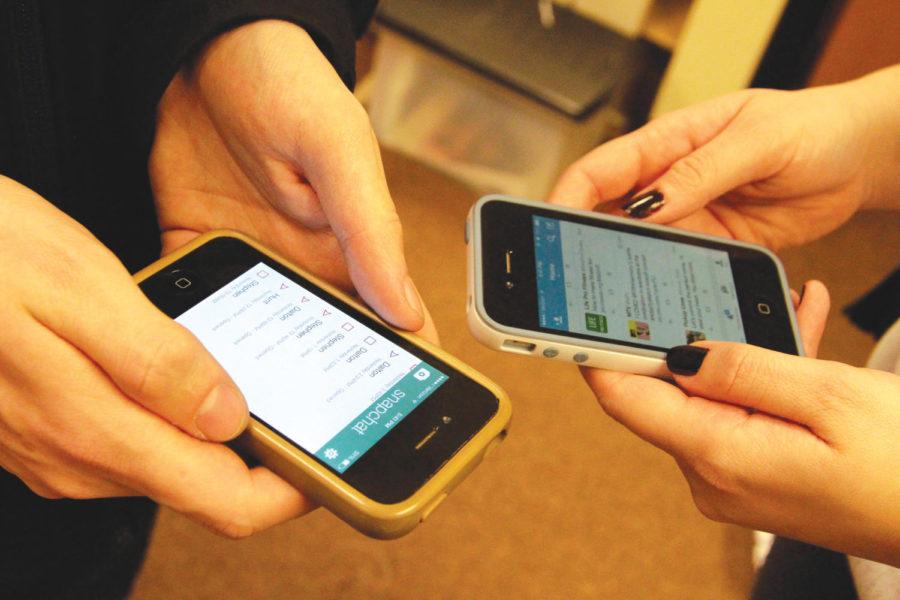McGrath: Technology ruining social interaction
Photo Illustration: Tiffany Herring/Iowa State Daily
technology and communication
January 30, 2014
Twitter. Facebook. Instagram. Snapchat. Repeat.
Ever find yourself participating in this ritual over and over again throughout the day? A recent study done by Nielsen, shows that 79 percent of young adults now own smartphones. If you are a part in this percentage, chances are you have done this cycle. Many of us do this ritual while we are bored in class, riding the bus or passing time between classes. It keeps us in touch with what is going on in our friends’ lives or even around the world.
Smartphones are a great way to keep in touch with our friends and family when we are away from them. You can send quick texts throughout the day to your parents to keep them updated and happy. Whether you care or not, you can find out what your peers are up to via Snapchat or Twitter. Your cousin can even share with the rest of the family that she is expecting a baby via Facebook.
All this information and socializing is available at the tips of our fingers every second of the day, and there is no doubt we are taking advantage of it. Results of data collected by the Android app Locket show that the average person checks his or her phone 110 times a day, with the highest frequency user checking the phone up to 900 times daily.
While these socializing capabilities have their advantages, they can significantly decrease the frequency and quality of face-to-face socializing. After watching the YouTube video “I Forgot My Phone,” a video exploiting cell phones and their detrimental effects on face-to-face interactions, I was at first in denial. But then it got me thinking — do I use my phone this much? Is this how badly my friends and I interact? If so, that’s unsettling. I started paying more attention to my phone use and that of those around me. While some parts of this video were a little extreme, most of them were sadly 100 percent true.
I found that, just like in the video, it’s not uncommon for people to be on their phones while spending time with people in person. While out to dinner, I noticed that most of us were checking our phones when conversation died down, and some of the time the conversation is centered around something we saw on social media. When going out with friends, it seems that we can’t go the night without posting on social media and snapchatting anyone that’s not with us. When having an intimate conversation, let’s face it, we’ve all been ignored or interrupted because the person we are with decides to check their phone.
Yet, it’s not just intimate gatherings that our phone usage is hurting. Think about it: How many times have you gone to a concert and not had your phone out to record, take a picture or tweet? Instead of living in the moment and fully experiencing the show, you’re experiencing it through your phone. Sure, it’s nice to have pictures and videos to capture these memories, but what you’ll really remember is how you felt at that time. If you’re not fully experiencing and enjoying the show and the people you’re with, then there’s not much worth remembering anyway.
It seems this is what society has come to. Instead of enjoying and interacting the people we are with, we have to be texting someone else, posting pictures of what we are doing on Instagram or scrolling through social media. We are no longer truly living in the moment.
I think we all want to enjoy the people and environments we are surrounded by at any moment in time, but it can be hard to break this addiction we have to our phones. I challenge you to turn your phone on silent and not check it while out to dinner with friends. I challenge you to go to a concert and keep your phone in your pocket or purse and let yourself just fully live in that moment. I challenge you to take pictures from your evening, but not take any precious time from the night to post them and do it the next morning when you’re alone. I challenge you to hang out with your family or friends for a night without checking your phone every time you get a text, snapchat or social media notification. I challenge you to give the people you’re with 100 percent of your attention and see how positively that can change your interaction with them.

















